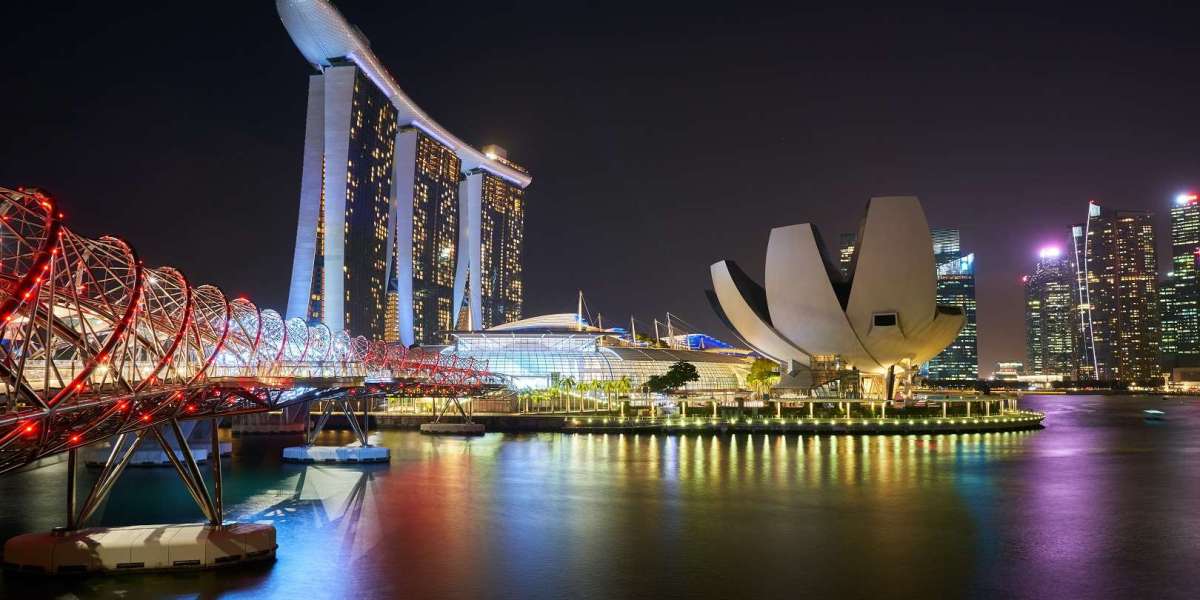All you need to know about Singapore
Singapore, officially known as the Republic of Singapore, is a vibrant and thriving city-state located in Southeast Asia. Known for its efficient governance, remarkable economic success, and diverse cultural landscape. Singapore has emerged as a global hub for commerce, finance, and tourism. This descriptive essay aims to provide an overview of Singapore's history, geography, society, economy, culture, and notable landmarks, showcasing the unique characteristics that have made it an exceptional nation.
One must browse Singapore tour packages while planning a trip to Singapore.
Geography:
Geographically, Singapore is situated at the southern tip of the Malay Peninsula, with the Strait of Malacca to its west and the South China Sea to its east. Despite its small size, spanning just over 700 square kilometres, Singapore has managed to transform itself from a humble fishing village to a bustling metropolis. The island has flat, low-lying terrain and a tropical climate, with consistent temperatures throughout the year.
With a total land area of just over 700 square kilometres (270 square miles), Singapore is one of the smallest countries in the world. Despite its small size, Singapore has managed to maximize its land use efficiently, transforming itself into a highly developed urban centre.
Singapore's strategic location has given it access to major sea routes, particularly the Strait of Malacca, one of the busiest shipping lanes in the world. The country's natural harbour has been instrumental in its development as a global trading hub and a vital maritime centre.
Singapore has a tropical rainforest climate, characterized by high humidity, abundant rainfall, and consistent temperatures throughout the year. The average temperature ranges from 25 to 31 degrees Celsius (77 to 88 degrees Fahrenheit), with April and May being the hottest months. The country experiences two main monsoon seasons—the northeast monsoon from December to March and the southwest monsoon from June to September.
In recent years, Singapore has also reclaimed land from the sea to expand its territory. The Marina Bay Sands integrated resort and the Gardens by the Bay are prime examples of successful land reclamation projects, adding both recreational and tourist attractions to the city-state.
History:
Singapore's history dates back to the 14th century when it was a part of the ancient Kingdom of Singapura. Over the centuries, the island saw the arrival of various communities, including Malays, Chinese, Indians, and Europeans. In 1819, Sir Stamford Raffles, a British statesman, founded modern Singapore as a trading post of the British East India Company. The British colonial era lasted until 1963 when Singapore gained independence and became a sovereign nation.
In the early years of independence, Singapore faced numerous challenges, including limited natural resources and a lack of land for development. However, under the visionary leadership of its first Prime Minister, Lee Kuan Yew, Singapore embarked on a rapid transformation. Through strategic urban planning, investments in education, infrastructure, and the promotion of foreign investments, Singapore managed to attract multinational corporations and establish itself as a regional economic powerhouse.
The earliest known records of human habitation in Singapore date back to the 14th century, At that time it was part of the Srivijaya Empire. The island was then known as Temasek, meaning "Sea Town" in Javanese. It served as a trading port and fishing village for various communities, including Malays, Chinese, and Indians.
In 1819, Sir Stamford Raffles, a British statesman, arrived in Singapore and recognized its strategic potential as a trading post. He negotiated a treaty with the local Malay rulers and established Singapore as a trading settlement of the British East India Company. Under British colonial rule, Singapore quickly grew into a bustling port and attracted immigrants from various parts of Asia and Europe.
Economy:
Singapore's economy is open, efficient, and innovative. It is one of the world's leading financial centres and a major global trading hub. The country has a well-developed transportation and logistics network, including one of the busiest ports in the world. Singapore is known for its strong rule of law, low corruption levels, and highly skilled workforce. Key sectors driving its economy include finance, manufacturing, electronics, biomedical sciences, and tourism.
The multicultural fabric of Singapore is one of its defining features. The country is home to a diverse population, comprising Chinese, Malay, Indian, and various other ethnic communities. English, Malay, Mandarin, and Tamil are the official languages, reflecting Singapore's linguistic diversity. The government's commitment to racial and religious harmony has fostered a society where people from different backgrounds coexist peacefully and celebrate their respective traditions and festivals.
Singapore's economy is characterized by its openness and reliance on international trade. The country has established itself as a major global trading hub, with goods flowing through its ports and airports. Singapore's strategic location along major shipping routes, particularly the Strait of Malacca, has contributed to its success as a trading nation.
Major Contributor To the Economy:
The country's key industries include finance, manufacturing, electronics, biomedical sciences, information and communication technology (ICT), and tourism. The financial services sector, in particular, is a significant contributor to Singapore's economy. It is home to numerous international banks, insurance companies, and asset management firms, making Singapore a leading global financial centre.
Manufacturing also plays a crucial role in Singapore's economy. The country has moved away from labour-intensive industries and focused on high-value manufacturing, such as electronics, precision engineering, chemicals, and pharmaceuticals. Singapore is known for its advanced manufacturing capabilities and cutting-edge technology adoption.
Singapore has also embraced the digital revolution, positioning itself as a leader in ICT and digital innovation. The government has actively promoted the development of a vibrant startup ecosystem. By investing in infrastructure to support digital connectivity and technology adoption.
Culture:
Singapore's cultural scene is a rich tapestry of traditions and modernity. The city-state boasts a vibrant arts and entertainment scene, with world-class museums, galleries, theatres, and music festivals. The Esplanade, a distinctive durian-shaped performing arts centre, stands as a symbol of Singapore's commitment to promoting the arts. The country also takes pride in its culinary heritage, with a wide array of street food stalls. These are known as hawker centres, offering tantalizing dishes from various cuisines.
Language:
Singapore has four official languages: English, Mandarin Chinese, Malay, and Tamil. English is widely spoken and serves as the common language for intercultural communication. Many Singaporeans are bilingual or multilingual, often speaking their ancestral language along with English.
Food:
Singapore has vibrant and diverse food scene. Singaporean cuisine is a mix of various culinary traditions, including Chinese, Malay, Indian, and Peranakan (Straits Chinese) influences. Hawker centres, food courts, and local eateries offer a wide array of dishes. This includes Hainanese chicken rice, laksa, char kway teow, roti prata, and chilli crab.
Festivals:
Singapore celebrates a range of cultural festivals throughout the year. Chinese New Year, Hari Raya Puasa (Eid al-Fitr), Deepavali (Diwali), and Christmas are some of the major festivals celebrated by different communities. These festivities often involve vibrant decorations, traditional performances, and special culinary delights.
Religious Harmony:
Singapore is known for its religious harmony, with various religious groups coexisting peacefully. Major religions practised in Singapore are Buddhism, Islam, Hinduism, and Christianity. Religious buildings, such as temples, mosques, churches, and gurdwaras, can be found throughout Singapore.
Respect for Rules and Order:
Singapore is known for its strict laws and emphasis on maintaining order and cleanliness. The "Singaporean" culture values discipline, cleanliness, and respect for authority. Littering, jaywalking, and chewing gum in public are considered offences, and there are fines in place to discourage such behaviour.
Education and Meritocracy:
Education is highly valued in Singapore, and there is a strong emphasis on academic achievement. The education system focuses on cultivating a skilled workforce and promoting meritocracy. Students undergo rigorous examinations, such as the Primary School Leaving Examination (PSLE) and the GCE O-Level and A-Level exams.
Environment:
Beyond its economic and cultural facets, Singapore maintains a clean and green environment. The government has implemented stringent measures to ensure environmental sustainability, including the efficient management of waste, the conservation of water resources, and the creation of numerous parks and green spaces. The iconic Gardens by the Bay, with its futuristic Supertrees and stunning floral displays, exemplifies Singapore's dedication to preserving nature in an urban setting.
Singapore's skyline is dotted with architectural marvels that blend modernity with heritage. The Marina Bay Sands complex, featuring its iconic rooftop infinity pool, offers panoramic views of the cityscape. The Merlion, a mythical creature with the head of a lion and the body of a fish, has become an iconic symbol of Singapore and stands proudly as a reminder of its maritime history.
Despite its urbanization, Singapore preserves and creates green spaces. The city is known as a "Garden City" and has numerous parks, gardens, and nature reserves. Some notable examples include Gardens by the Bay, Singapore Botanic Gardens (a UNESCO World Heritage site), and East Coast Park.
Conclusion:
In conclusion, Singapore is a remarkable nation that has defied its physical limitations to become a global powerhouse in various domains. Its journey from a fishing village to a modern metropolis is a testament to its people's resilience, vision, and hard work. With its efficient governance, thriving economy, diverse society, and commitment to sustainability, Singapore continues to captivate the world as a shining example of what a small nation can achieve.









